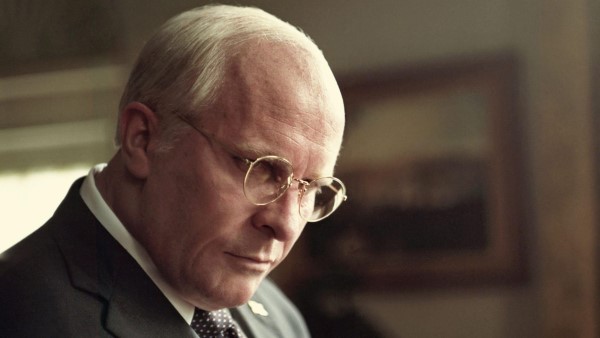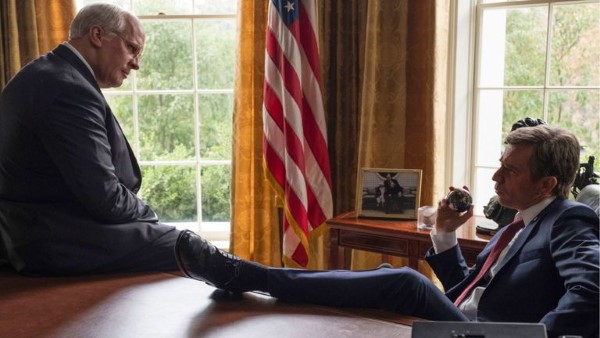
Let’s get the obvious out of the way first: Christian Bale is really good as Dick Cheney. Bale’s quantifiably strong performance (he added 40 pounds for the role, changed his accent again, the whole nine yards) will be justifiably discussed at great length this award’s season, and it’s already netted him a Golden Globe. But, thanks in part to an abysmal script from director/screenwriter Adam McKay, this movie is an incoherent mess; not even the terrific performances from its core cast are enough to save it.
This film is a tonal disaster. One second, we’re supposed to be really sad about something, the next we’re supposed to feel anger, the next we’re supposed to feel joy—all in three quick (and sometimes incoherent) cuts. McKay’s textbook style does not jibe with this story at all. His asides, inserted to explain difficult subjects (akin to explaining what CDOs and sub-prime loans are in The Big Short), feel awkward and forced, and the narrator (similar to Ryan Gosling’s character in The Big Short) isn’t integrated into the actual story anywhere near as well. But the biggest offender here is the editing.
I’m not sure why there’s a huge drop-off between this and McKay’s previous endeavor. The same editor (Hank Corwin) did both films, so why does the editing from The Big Short work so well while here it feels like an unwelcome menace? In 2015, Corwin received a deserved Oscar nomination for his editing on The Big Short. But I think it’s rather safe to say he will not repeat the accomplishment with Vice. The editing is incomprehensible, discombobulating and even uncomfortable at various points.
All of this dumbfounds me. The Big Short has resonated with me far more than most films, and I have always been fascinated by the stealthy corruption of the Bush 43 administration. Vice should’ve been a grand slam!

One undeniably good thing is the acting. Beyond Bale’s performance, you have stellar performances from the rest of the cast. Amy Adams is a tour de force as always, and here her presence is felt even when she’s not onscreen. I was fascinated to learn of the power Lynne Cheney had over her husband. Her power is felt right from the first scene, which also happens to be one of the best sequences of the film. Sam Rockwell does a great George W. impression, Steve Carell is great as Rumsfeld, LisaGay Hamilton does a great Condoleezza Rice and Tyler Perry continues to surprise when he feels like acting with a great Colin Powell. The 9/11 sequence in particular allowed Carell, Hamilton and Perry to all shine brightly in their respective roles on one of the darkest days in American history.
However, that initial scene between Lynne and Dick is as frustrating as it is invigorating, as two world-class actors go at it in a tense exchange. It’s frustrating because this film does way more to tell you about Dick Cheney the man rather than Dick Cheney the ruthless VP. McKay spent way too much time explaining how Cheney and his team dealt with the legality of his overreach versus actually showing us the overreaches he made (outside of the situation room on 9/11).
As much as I enjoy watching great actors be great, it’s simply not enough to save this film from the infuriating realm of mediocrity. At the end of the day, that’s where this film, and its messy script and indecipherable editing, will forever rest.













